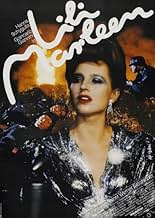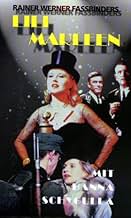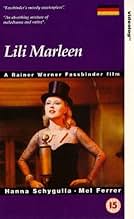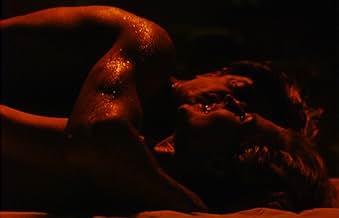VALUTAZIONE IMDb
7,1/10
4639
LA TUA VALUTAZIONE
Aggiungi una trama nella tua linguaIn 1938, a German singer falls in love with a Jewish composer in Zurich, who helps Jews flee Nazi Germany. She wants to help but is forced back to Germany. Her song "Lili Marleen" becomes a ... Leggi tuttoIn 1938, a German singer falls in love with a Jewish composer in Zurich, who helps Jews flee Nazi Germany. She wants to help but is forced back to Germany. Her song "Lili Marleen" becomes a hit with soldiers and the Nazi top brass.In 1938, a German singer falls in love with a Jewish composer in Zurich, who helps Jews flee Nazi Germany. She wants to help but is forced back to Germany. Her song "Lili Marleen" becomes a hit with soldiers and the Nazi top brass.
- Regia
- Sceneggiatura
- Star
- Premi
- 1 vittoria e 4 candidature totali
Karl-Heinz von Hassel
- Henkel
- (as Karl Heinz von Hassel)
Raúl Gimenez
- Blonsky
- (as Raul Giminez)
Recensioni in evidenza
The story of a song in Nazi Germany.. a fiction piece masterly created by Fassbinder. Whilst a stimulating watch, it feels editing could have been tighter at times.
Afterwards you can not get the song 'Lili Marleen' out of y head.
Best to watch the German version instead of the dubbed English one.
Yes, there is such a thing, despite the fact that IMDb does not currently list it.
This film is a clever examination of how hard it was NOT to become part of the Nazi system. Willie is a German singer, in love with a Swiss Jewish conductor. She returns to Germany to help her lover with the resistance, however his father - who disapproves of their relationship - has arranged that she will not be able to return to Switzerland. Stranded in Berlin, Willie is forced to use a Nazi connection just to get some work...and he just happens to be the newly appointed Cultural Director. So Willie is given the opportunity to perform and record 'Lili Marleen'. The song becomes a hit, and Hitler becomes a fan. I won't go into the rest of the plot, but be assured that there are twists and turns.
By the end of this movie, you will not be able to get the song 'Lili Marleen' out of your head as it is repeated countless times. Believe me, I saw the film last week, and I am still singing it.
This film is a clever examination of how hard it was NOT to become part of the Nazi system. Willie is a German singer, in love with a Swiss Jewish conductor. She returns to Germany to help her lover with the resistance, however his father - who disapproves of their relationship - has arranged that she will not be able to return to Switzerland. Stranded in Berlin, Willie is forced to use a Nazi connection just to get some work...and he just happens to be the newly appointed Cultural Director. So Willie is given the opportunity to perform and record 'Lili Marleen'. The song becomes a hit, and Hitler becomes a fan. I won't go into the rest of the plot, but be assured that there are twists and turns.
By the end of this movie, you will not be able to get the song 'Lili Marleen' out of your head as it is repeated countless times. Believe me, I saw the film last week, and I am still singing it.
It is based on the song Lili Marleen, sung by Lale Andersen, and her romance with Rolf Liebermann in the movie Willie and Robert. The film tried to be very impartial in relation to Lale and Nazism, although she helped discreetly, and for Robert, the Allies, however in the end, she ended up surrendering to Nazism, to continue singing, to leave the Black List, had to change her famous song with a military air, she didn't marry Rolf, but kept an eternal friendship, could have done better...
Even though Lili Marleen's events take place right before, during and up to the end of World War II, it is a movie centered around people and their feelings in typical Fassbinder fashion.
It is the story of Willie (played by the stunning Hanna Schygulla) and with her the story of Nazi Germany that follows a similar trajectory. She is a German that tries to make a living in Zurich as a singer/cabaret artist and falls in love with Robert (Giancarlo Giannini), a Jew and member of the anti-Nazi resistance camp. His family doesn't approve of their relationship, because she is German/Aryan and make sure they go their separate ways after her deportation. Back in Germany, she must find a way to survive and, seemingly out of nowhere, her song "Lili Marleen" becomes a monumental hit, a source of inspiration and courage for every German soldier, which brings Willie in a tricky spot, as it becomes harder and harder to maintain the balance between collaborating with the Nazis in an artistic level and taking part in the resistance against them all the while hoping for a reunion with Robert which seems more and more unlikely.
An interesting element of the movie is that it presents both sides in a nuanced way, it avoids portraying the Nazis as the one-dimensional caricature villains. It also shows how thin the lines are and how hard it can be to fight prejudice and shake off a social or political stigma.
And of course the song itself deserves its legendary status.
It is the story of Willie (played by the stunning Hanna Schygulla) and with her the story of Nazi Germany that follows a similar trajectory. She is a German that tries to make a living in Zurich as a singer/cabaret artist and falls in love with Robert (Giancarlo Giannini), a Jew and member of the anti-Nazi resistance camp. His family doesn't approve of their relationship, because she is German/Aryan and make sure they go their separate ways after her deportation. Back in Germany, she must find a way to survive and, seemingly out of nowhere, her song "Lili Marleen" becomes a monumental hit, a source of inspiration and courage for every German soldier, which brings Willie in a tricky spot, as it becomes harder and harder to maintain the balance between collaborating with the Nazis in an artistic level and taking part in the resistance against them all the while hoping for a reunion with Robert which seems more and more unlikely.
An interesting element of the movie is that it presents both sides in a nuanced way, it avoids portraying the Nazis as the one-dimensional caricature villains. It also shows how thin the lines are and how hard it can be to fight prejudice and shake off a social or political stigma.
And of course the song itself deserves its legendary status.
Rainer Werner Fassbinder is an important (or maybe the most important) director of the "Neue Deutsche Welle" of the seventies and eighties.
Until now I had seen only one of his films ("Angst essen Seele auf", 1974), preferring another director of the "Neue Deutsche Welle" (Werner Herzog) instead.
Also with other filmmovements I often prefer another director above the leading figure. With the French "Nouvelle vague" for example I prefer Claude Chabrol above Jean Luc Godard.
Nevertheless only one film of such an important director felt as too little to me and I decided to watch some more if the opportunity arose.
The first opportunity was "Lili Marleen" (1981) and maybe this was not the best oppurtunity. "Lily Marleen" is from the later stages of Fassbinder's career. He was already a renowned director and for this production had the disposal over a big budget. His aim was a film that would also perform well at the American box office. The film was recorded in English but later dubbed in German when the American success failed to materialize.
The story is about the female singer Willie (Hanna Schygulla) who is very successful in Nazi circles, being with the resistance in her private life. As such the story has similarities with "Black book" (2006, Paul Verhoeven).
The song Willie has success with is "Lili Marleen", which was a real existing song during the Second World War performed by Lale Andersen. Also Marlene Dietrich would occasionaly perform this song.
In my opinion "Lili Marleen" is a rather conventional movie according to Fassbinder standards (or at least as I expect Fassbinder standards to be). The most striking scenes are those in which Willie is performing her song. These scenes are edited with both images of soldiers resting in their trenches and very brutal war violence. These scenes are however more theatrical than shocking.
Until now I had seen only one of his films ("Angst essen Seele auf", 1974), preferring another director of the "Neue Deutsche Welle" (Werner Herzog) instead.
Also with other filmmovements I often prefer another director above the leading figure. With the French "Nouvelle vague" for example I prefer Claude Chabrol above Jean Luc Godard.
Nevertheless only one film of such an important director felt as too little to me and I decided to watch some more if the opportunity arose.
The first opportunity was "Lili Marleen" (1981) and maybe this was not the best oppurtunity. "Lily Marleen" is from the later stages of Fassbinder's career. He was already a renowned director and for this production had the disposal over a big budget. His aim was a film that would also perform well at the American box office. The film was recorded in English but later dubbed in German when the American success failed to materialize.
The story is about the female singer Willie (Hanna Schygulla) who is very successful in Nazi circles, being with the resistance in her private life. As such the story has similarities with "Black book" (2006, Paul Verhoeven).
The song Willie has success with is "Lili Marleen", which was a real existing song during the Second World War performed by Lale Andersen. Also Marlene Dietrich would occasionaly perform this song.
In my opinion "Lili Marleen" is a rather conventional movie according to Fassbinder standards (or at least as I expect Fassbinder standards to be). The most striking scenes are those in which Willie is performing her song. These scenes are edited with both images of soldiers resting in their trenches and very brutal war violence. These scenes are however more theatrical than shocking.
Lo sapevi?
- QuizShot in English for American distribution; later dubbed in German
- BlooperKaufmann, the German officer who arrests Robert on the train, wears the uniform of an SS-Gruppenfuhrer (General) - it is highly unlikely that an SS General of such rank would be checking identity papers at random on a train.
- ConnessioniFeatured in Century of Cinema: Die Nacht der Regisseure (1995)
- Colonne sonoreLili Marleen
(German Version)
(based on a poem from the 1915 book "Die kleine Hafenorgel" by Hans Leip)
Music By Norbert Schultze,
Vocals Hanna Schygulla
(p) 1981 Schlicht Musikverlag, Phonogram, GmbH, DRG Records, Inc., Philips
© Metropolis Records
Published By Brampton Music Ltd., Chappell Music Ltd., Peter Maurice Music,
EMI Music
I più visti
Accedi per valutare e creare un elenco di titoli salvati per ottenere consigli personalizzati
- How long is Lili Marleen?Powered by Alexa
Dettagli
- Data di uscita
- Paese di origine
- Lingue
- Celebre anche come
- La vida íntima de Lili Marleen
- Luoghi delle riprese
- Aziende produttrici
- Vedi altri crediti dell’azienda su IMDbPro
Botteghino
- Budget
- 10.500.000 DEM (previsto)
- Lordo Stati Uniti e Canada
- 8144 USD
- Fine settimana di apertura Stati Uniti e Canada
- 11.623 USD
- 16 feb 2003
- Lordo in tutto il mondo
- 8158 USD
Contribuisci a questa pagina
Suggerisci una modifica o aggiungi i contenuti mancanti


























